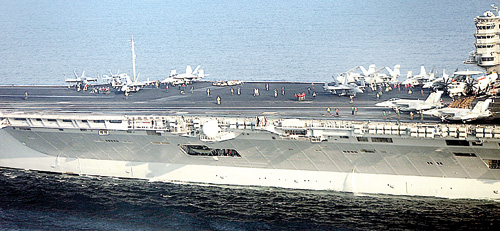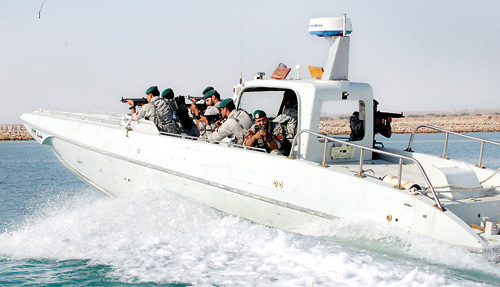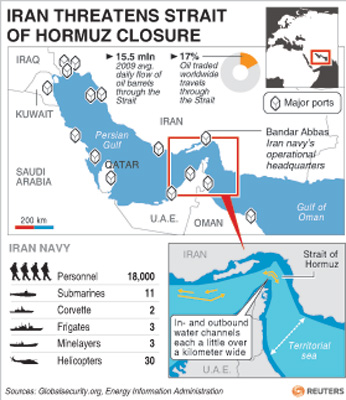When Defence Secretary Leon Panetta opined earlier this month that an Israeli attack on Iran's nuclear facilities could "consume the Middle East in a confrontation and a conflict that we would regret," the Israelis went ballistic behind the scenes. Michael Oren, Israel's ambassador to Washington, lodged a formal diplomatic protest known as a demarche. And the White House was thrust into action, reassuring the Israelis that the administration had its own "red lines" that would trigger military action against Iran, and that there is no need for Jerusalem to act unilaterally.
Panetta's seemingly innocent remarks on Dec. 2 triggered the latest drama in the tinder-box relationship that the Obama administration is trying to navigate with Prime Minister Benjamin Netanyahu's government. With Republicans lining up to court Jewish donors and voters in America in 2012, Obama faces a tricky election-year task of ensuring Iran doesn't acquire a nuclear bomb on his watch while keeping the Israelis from launching a preemptive strike that could inflame an already teetering Middle East.
The stakes are immensely high, and the distrust that Israelis feel toward the president remains a complicating factor. Those sentiments were laid bare in a speech Netanyahu's minister of strategic affairs, Moshe Ya'alon, gave on Christmas Eve in Jerusalem, in which he used Panetta's remarks to cast doubt on the U.S.'s willingness to launch its own military strike.
Ya'alon told the Anglo-Likud, an organization within Netanyahu's Likud party that caters to native English speakers, that the Western strategy to stop Iran's drive for nuclear weapons must include four elements, with the last resort being a military strike.
"The fourth element of this combined strategy is the credible military strike," Ya'alon said, according to a recording of the speech provided to The Daily Beast. "There is no credible military action when we hear leaders from the West, saying, 'this is not a real option,' saying, 'the price of military action is too high.'
Getting US, Israel on the same page
The lack of trust between the Israeli and American leaders on Iran has been a sub-rosa tension in the relationship since 2009. Three U.S. military officials confirm to The Daily Beast that analysts attached to the Office of the Secretary of Defence are often revising estimates trying to predict what events in Iran would trigger Prime Minister Netanyahu to authorize a military attack on the country's nuclear infrastructure.
Despite repeated requests going back to 2009, Netanyahu's government has not agreed to ask the United States for permission or give significant advanced warning of any pending strike.
 |
| The U.S. naval ship is pictured during the Iran war game in the Sea of Oman, near the Strait of Hormuz in southern Iran on Thursday. Reuters |
 |
| Iranian military personnel participate in the war game near the Strait of Hormuz in southern Iran. Reuters |
The sensitive work of trying to get both allies on the same page intensified this month. Israeli Defence Minister Ehud Barak visited Washington last week to go over Iran issues; and the undersecretary of state for political affairs, Wendy Sherman, and a special arms control adviser to Secretary of State Hillary Clinton, Robert Einhorn, were in Israel last week to discuss Iran as well. Panetta for his own part has revised his tone on the question of Iran's nuclear programme, telling CBS News last week that the United States was prepared to use force against Iran to stop the country from building a nuclear weapon.
The new diplomacy has prompted new conversations between the United States and Israel over what the triggers - called "red lines" in diplomatic parlance - would be to justify a pre-emptive attack on Iran's nuclear facilities.
Matthew Kroenig, who served as special adviser on Iran to the Office of the Secretary of Defence between July 2010 and July 2011, offered some of the possible "red lines" for a military strike in a recent Foreign Affairs article he wrote. He argued that the U.S should attack Iran's facilities if Iran expels international nuclear weapons inspectors, begins enriching its stockpiles of uranium to weapons-grade levels of 90 percent, or installs advanced centrifuges at its main uranium-enrichment facility in Qom.
In an interview with The Daily Beast, Kroenig also noted that Iran announced in 2009 that it was set to construct 10 new uranium enrichment sites. "I doubt they are building ten new sites, but I would be surprised if Iran was not racing to build some secret enrichment facilities," Kroenig said. "Progress on new facilities would be a major factor in our assessment of Iran's nuclear programme and shape all aspects of our policy towards this including the decision to use force."
Until recently, current and former Obama administration officials would barely broach the topic in public, only hinting vaguely that all options are on the table to stop Iran's programme. Part of the reason for this was that Obama came into office committed to pursuing negotiations with Iran. When the diplomatic approach petered out, the White House began building international and economic pressure on Iran, often in close coordination with Israel.
All the while, secret sabotage initiatives like a computer worm known as Stuxnet that infected the Siemens-made logic boards at the Natanz centrifuge facility in Iran, continued apace. New U.S. estimates say that Stuxnet delayed Iran's nuclear enrichment work by at most a year, despite earlier estimates that suggested the damage was more extensive.
Next step is military action
Last week in a CBS interview, Panetta said Iran's development of a nuclear weapon is a "red line." White House advisers have more recently broached the subject more specifically in private conversations with outside experts on the subject.
Patrick Clawson, the director of research for the Washington Institute for Near East Policy said, "If Iran were found to be sneaking out or breaking out then the president's advisers are firmly persuaded he would authorize the use of military force to stop it." But Clawson added, "The response they frequently get from the foreign policy experts is considerable scepticism that this is correct, not that these people are lying to us, but rather when the occasion comes we just don't know how the president will react."
Henry Sokolski, the executive director the Nonproliferation Policy Education Center, said "You don't propose and go about doing an oil embargo unless you are serious about taking the next step, and the next step for the administration is clearly some form of military action, and people who have left the administration like Dennis Ross have made it clear that this is precisely what's on this administration's mind."
Ross did not respond to emails and phone calls requesting comment.
Ironically, Panetta often is the official the Obama administration uses to engage Israel. "Panetta has been straightforward with the Israelis and they seem to appreciate that," one senior administration official said. "The Israelis view Panetta as an honest broker." In some ways that is why his remarks stung Netanyahu's government so much.
Complicating matters, the Dec. 2 remarks also came at the same time a high-level delegation of Israeli diplomats, military officers and intelligence officials were in Washington for an annual meeting called the strategic dialogue. At the meeting, the Israeli side offered a new presentation on Iran's nuclear programme suggesting that Iran's efforts to build secret reactors for producing nuclear fuel were further along than the United States has publicly said. Some of the intelligence was based on soil samples collected near the suspected sites.
Part of the issue now between the United States and Israel are disagreements over such intelligence. The Israelis and the U.S. both believe that Iran suspended its work on weaponization, or the research and testing on how to fit an atomic explosion inside a warhead, in 2003 shortly after the U.S. invasion of Iraq.
Israel insists Iran on nuke hunt
The Israelis, however, say the Iranians started that work again in 2005, according to Israeli officials and Ya'alon, who said this in his speech on Christmas Eve. The 2007 and 2011 U.S. national intelligence estimates for Iran say this weaponization work remains suspended.
The Israelis also say a recent document uncovered by the International Atomic Energy Agency (IAEA) that shows detailed plans for constructing a "neutron initiator," or a pellet that sits at the middle of the nuclear core and is crushed by high explosives in a nuclear explosion, is evidence that Iran is continuing its weaponization work.
The latest IAEA report released in November said members states had shared intelligence alleging that Iran had conducted explosive tests associated with nuclear weapons research.
A senior administration official told The Daily Beast, "Both Americans and Israelis agree that some research and design work is probably continuing in the event the Iranians decide to move ahead with weaponization."
The intelligence disagreement is significant in part because one of the factors in drawing up red lines on Iran's programme is how much progress Iran has made in constructing secret enrichment facilities outside of Natanz, where IAEA inspectors still monitor the centrifuge cascades. In 2009, the Obama administration exposed such a facility carved into a mountain outside of the Shiite holy city of Qom. The IAEA has chastised the Iranians for not fully disclosing their work on the Qom site until the United States forced the regime's hand.
(Eli Lake is the senior national-security correspondent for Newsweek and the Daily Beast. He previously covered national security and intelligence for the Washington Times. Lake has also been a contributing editor at The New Republic since 2008 and covered diplomacy, intelligence, and the military for the late New York Sun. He has lived in Cairo, Egypt, and traveled to war zones in Sudan, Iraq, and Gaza. He is one of the few journalists to report from all three members of President Bush's axis of evil: Iraq, Iran, and North Korea.)
Courtesy The Daily Beast
Brinkmanship over vital oil strait worsens
TEHRAN, (AFP) - A showdown between Iran and the United States over Tehran's threats to close the strategic Strait of Hormuz to oil tankers has worsened with warships from each side giving weight to an increasingly bellicose exchange of words.
Iran's Revolutionary Guards rejected a warning that the US military would "not tolerate" such a closure, saying they would act decisively "to protect our vital interests."State Department spokeswoman Victoria Nuland said Thursday that Iran had exhibited "irrational behavior" by threatening to close the strait.
"One can only guess that the international sanctions are beginning to feel the pinch, and that the ratcheting up of pressure, particularly on their oil sector, is pinching in a way that is causing them to lash out."The tough language came as two US warships entered a zone where the Iranian navy's ships and aircraft were in the middle of 10 days of war games designed as a show of military might.
But a US navy spokeswoman said later that the aircraft carrier USS John C. Stennis and the guided-missile cruiser USS Mobile Bay had transited without incident on Tuesday, in pre-planned, routine operation.
"Our interaction with the regular Iranian Navy continues to be within the standards of maritime practice, well-known, routine and professional," Fifth Fleet spokeswoman Lieutenant Rebecca Rebarich said.
The transit area was in waters east of the Strait of Hormuz, a choke point at the entrance to the Gulf through which more than a third of the world's tanker-borne oil passes.
Iranian Vice President Mohammad Reza Rahimi warned this week that "not a drop of oil will pass through the Strait of Hormuz" if the West followed through with planned additional sanctions against Iran over its nuclear programme.
The navy commander, Admiral Habibollah Sayari, backed that up by saying it would be "really easy" to close the strait.
A US Defence Department spokesman riposted Wednesday that "interference with the transit... of vessels through the Strait of Hormuz will not be tolerated."
But Brigadier General Hossein Salami, the deputy commander of Iran's powerful Revolutionary Guards, told Fars news agency on Thursday that "our response to threats is threats."
"We have no doubt about our being able to carry out defensive strategies to protect our vital interests -- we will act more decisively than ever," he was quoted as saying.
"The Americans are not qualified to give us permission" to carry out military strategy, he said.
Admiral Sayari said the US aircraft carrier was monitored by Iranian forces as it passed from the Strait of Hormuz to the Gulf of Oman, state television reported.
It broadcast footage of an aircraft carrier being shadowed by an Iranian plane.
An Iranian navy spokesman, Commodore Mahmoud Mousavi, told the official IRNA news agency the US carrier went "inside the manoeuvre zone" where Iranian ships were conducting their exercises.
He added that the Iranian navy was "prepared, in accordance with international law, to confront offenders who do not respect our security perimeters during the manoeuvres."
US officials had said on Wednesday that the Stennis and its carrier strike group were moving through the Strait of Hormuz.
Pentagon press secretary George Little said this was "a pre-planned, routine transit" to the Arabian Sea to provide air power for the war in Afghanistan.
The United States maintains a navy presence in the Gulf in large part to ensure oil traffic there is unhindered. Its Fifth Fleet is based in Bahrain.
Iran, which is already subject to several rounds of sanctions over its nuclear programme, has repeatedly said it could target the Strait of Hormuz if attacked or its economy is strangled.
Such a move could cause havoc on world oil markets, disrupting the fragile global economy, although analysts say the Islamic republic is unlikely to take such drastic steps as it relies on the route for its own oil exports.
Iran's naval manoeuvres included the laying of mines and the use of aerial drones, according to Iranian media. Missiles and torpedoes were to be test-fired in the coming days.
Earlier this month, Iranian officials said a Revolutionary Guards cyber-warfare unit had hacked the controls of a US bat-winged RQ-170 Sentinel reconnaissance drone and brought it down safely.
Analysts and oil market traders are watching the developing situation in and around the Strait of Hormuz carefully, fearing that a spark could ignite open confrontation between the long-time foes.
The United States had proposed a military hotline between Tehran and Washington to defuse any "miscalculations" between their navies, but Iran in September rejected that offer.
Iran test fires long-range missiles in Gulf exercise
TEHRAN, Dec 31 (Reuters) - Iran test-fired long range missiles today during a naval exercise in the Gulf, the semi-official Fars news agency reported. "Iran test-fired missiles including long range (missiles), surface to sea ... in the Persian Gulf," Fars said. |




